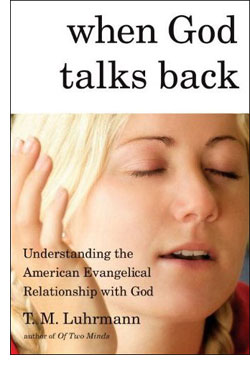 |
 |
 T. M. Luhrman
T. M. Luhrman
When God Talks Back: Understanding the American Evangelical Relationship With God
Knopf / Random House
US Trade Hardcover First
ISBN 978-030-726479-4
Publication Date: 03-27-2012
436 Pages; $28.95
Date Reviewed: 04-19-2012
Reviewed by: Rick Kleffel © 2012
Index:
Non Fiction
There must be more to this world than the world itself. That much we know; anything else is, by definition guesswork. We know and are part of the natural; beyond that is the unknown, the supernatural, the realm of religions and spirituality. The division is so clear that it is easy to miss a crucial fact; we apprehend both the known and the unknown with our minds.
In 'When God Talks Back: Understanding the American Evangelical Relationship With God,' T. M. Luhrman gives a clear, well written, scientific vision of the mind as it examines the ineffable. She describes with amazing clarity just how the natural minds of our natural world confront the supernatural. It's a gripping, well-organized reading experience that will keep readers thoroughly, thrillingly engaged in a world that they can neither touch not taste nor see.
Luhrman's book begins with some simple questions; how and why do people believe in a supernatural God in an age of rational science? Luhrman is a psychological anthropologist and decided to find an answer to those questions by investigating the beliefs and examining the experiences of American Evangelical Christians. In her preface, she sets forth her premise, some of her methods and thoroughly hooks the reader for the very intense and strange journey that follows.
Luhrman decided to focus on one specific church, The Vineyard, a rather low-key version of Evangelical Christianity that focuses on prayer as a means of bringing the voice of the Christian God into one's mind. Written in an almost novelistic style, her book takes readers step-by-step through the process that congregants in the Church use to hone their ability to actually experience God as a separate being who speaks to them in their minds. It proves to be a fascinating, ground-breaking exploration of the supernatural experience with the toolkit of psychological anthropology.
Characters are a key component in 'When God Talks Back,' and one in particular, Sarah, carries us through the book. Sarah offers readers a chance to experience the full-range of the Christian experience, from the highs of hearing God's voice in one's mind to diagnosed mental illness. Luhrman makes it quite clear that the voices that these Christian evangelical congregants hear are not the result of madness, however. She gives a very thorough and fascinating look at how prayer is used to segregate one's thoughts into those of one's self and those of an external, loving God. It's a crystal-clear scientific look at a truly supernatural experience that does not presume to know the reality of the supernatural. Luhrman's work in this sense is nothing short of brilliant.
Beyond her abilities to examine the supernatural with scientific exactitude, Luhrman brings an engaging prose style and a grand sense of organization to her material. She's able to convey her utterly new material in a manner that's truly enjoyable to read. We meet a gallery of entertaining characters and see them through her eyes, and Luhrman herself plays an appropriately large part in the narrative. The design of the experiment at the center of the work is fascinating and itself has the compelling pull of a crime narrative.
'When God Talks Back' is enjoyable and accessible, which is fortunate, because it is an essential work that explores issues at the heart of our conflicted culture. Luhrman manages to examine the religious life with scientific eyes and the scientific life with religious eyes. She shortcuts prejudice and politics entirely, with the result that readers of all beliefs will find themselves empathizing with those who differ. What Luhrman does with 'When God Talks Back' is nothing less than use science to unite us — in this world, as well as the next.
|
 |
|
|
 |
| |
Review Archive
All Reviews alphabetized by author.
General Fiction
Non-Genre, general fiction and literature.
Horror
Supernatural fiction, supernatural horror and non-supernatural horror.
Science Fiction
Science fiction, science fantasy, speculative fiction, alternate history.
Fantasy
Fantasy, surrealism and magic realism.
Mystery
Crime, thrillers, mystery, suspense.
Non-Fiction
Non-Fiction, True Crime, Forteana, Reference.
Poetry
|
|
 |
|




